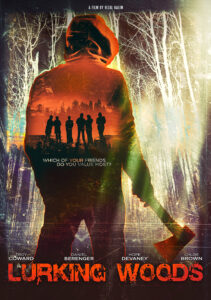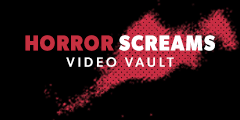Interview Desmond Hew ~ Screenwriter for LURKING WOODS
 1) What made you want to get involved in the film industry?
1) What made you want to get involved in the film industry?
My absolute love for the movies I guess. I was first fascinated by the creature-features like Predator and Alien, as well as the cyborg-films such as Terminator and Robocop. If anything, these four films/ franchises are always the ones I go back to again and again. i can never get bored of them. I refer to them a lot in whichever inspiration I need, whether it’s to learn how to create a scene of suspense, action, well-done frenetic editing, cool sound designs, even cinematography, directing. When I moved into screenwriting, seeing how each of those films strategically reveal the title character piece by piece as the narrative progressed was also vital for me learning the art of storytelling. As I grew older, I obviously explored the other films that are considered critically acclaimed like the Godfather, 2001 A Space Odyssey, Citizen Kane, Goodfellas, 12 Angry Men, Psycho, etc. My personal fav of the Oscar bunch is The Shawshank Redemption. By the way, to digress a bit, I make an effort to always keep a grasp on popcorn blockbuster films, ya know the big franchises that are mainly for entertainment. Just because I write doesn’t mean I only watch those oscar-batey drama movies. I noticed some writers, based on the forums I go to, they tend to dismiss the blockbusters/ entertainment films, thinking they are all popcorn and there’s nothing real to learn for screenwriting. I personally think as a writer, you should still watch them, especially the ones that are big hits and see what you can glean from them and never lose your sense of wanting fun in your movies. You can’t have time to watch everything but don’t get too comfortable with only certain types of films or writing.
2) Do you know early on that you wanted to be a screenwriter?
Not really. I know I definitely wanted to know how to make cool movies, but that was mainly through directing. Directing was what I wanted to get good at. At first it seemed to me that it was something mainly technical, which I didn’t have a problem with and I loved figuring out production problems like how to pick my angles or lenses to show how something visually unfolds, whether it’s a character emotion beat or a non-dialogue suspenseful sequence. But the more I looked into ‘What makes a good/ great Director’, you find the same answer over and over, even if you aspire to be a great Cinematographer, Editor, Sound Editor, etc, the answer is the same ~ you must know storytelling, or at least understand it. All those key roles depend largely on it. Hence I got into some self-taught writing. Actually I had to because there was no school at all for that sort of thing in my country, or at the time online segments weren’t a thing at the time. I started off learning the basics of screenwriting which anyone now can look up but I also then studied the films I loved, to see how they did their storytelling stuff, like introduce characters, layer in their themes if any, have the characters change as the story progresses, how they end or resolve things, all that stuff. The one rule I told myself, because when you are learning it’s always possible to learn from the wrong movies, is to always pick films that I personally love, respect and that they were successful whether in both box office or with critics. If it was a movie I liked but was loathed by seemingly everyone else, and failed at making money, I wouldn’t stay clear, but would tread carefully, so to speak.
3) What does your writing process look like?
Figure out the the main premise, usually someone tells me the premise or their idea and then I take over but it’s either the premise or core-idea that comes first. Then I’ll figure out the whole structure on what happens in the beginning, middle and end as well as the character arc(s). This happens through the outline process where you can be as disorganized and messy as you like and stuff in as many possible ideas as much as possible to see what matches what doesn’t. I will eventually settle on a decision for every problem and then transfer them all to the actual script stage where formatting and proper sentences must of course be done. Along the way of doing this, things can change based on my gut, like me thinking a scene or section should either be deleted or brought forward. Screenwriting really is a process of discovery.
4) What is a common mistake that you see made in horror screenplays?
Bit of a tough one for me. Generally I don’t see any ‘mistake’ that I could pick at that is related solely to horror. Obviously a lot of them aren’t perfect but the mistakes I find in them are what can be said about other not-so-good films from other genres such as insufficient character development for us to care about their predicament. Or everything is resolved in an uninteresting way. But I guess for horror, I could go with the obvious one which is too many jumpscares. I actually love them in general, but too many horror movies don’t know (or bother) how to build to it organically or build towards them strategically/ creatively. It takes quite a skill to do that of course but it is also too easy to not bother with the build up and I see the cheap-jumpscare being done to death. I by the way consider The Conjuring (2013) to be a great example of one that does the jumpscare stuff VERY well.
5) Should you factor in a budget before you actually write a screenplay?
I guess that would be a must and if you ignore it, the producer will make sure you don’t, haha. Well if you are referring to the exact dollars and cents, I don’t think that is a total must, but if the budget is kinda low, you should try to keep things minimal like locations, number of characters or are there heavy FX work involved, that kinda stuff. I read that Blumhouse keeps track of all that (among other things) to keep the cost down.
 6) What is a realistic budget for an indie filmmaker writing a screenplay?
6) What is a realistic budget for an indie filmmaker writing a screenplay?
Considering I haven’t yet actually written for Hollywood directly, I’ll have to take a stab. But for the case of indie, I’d say the objective is always to go as low as you can because you simply don’t have all the resources. So try to write something that you could hypothetically put into a 5 – 10 million dollar range? Don’t go over 10 million. Particularly for horror. Limit the location and characters. I would say go look at how Saw and Paranormal Activity put smart limitations in their stories and make it work for them.
7) How many pages is a sweet spot for a screenplay?
Try to target 100 pages. There’s no rule but when you’re basically undiscovered, that number is I think a nice sweet spot, whether if you’re doing horror or any other genre. Anything slightly above or below that number is also fine of course.
8) Do you think screenwriting has changed in your lifetime or is it basically the same?
I’d say it’s been the same. I have found ways to polish it as years go by and still do. How to say more with less is one example but what I like to write about, that stuff hasn’t changed. I’m still learning, never actually stopped ~ in addition to my other filmmaking skills. I really believe screenwriting is a skill that takes years just to get ‘barely good’ at. It’ll then take many more to even begin to get great. In ways it is tougher than doing a novel since that one operates in a very different way. I mean novels / books generally, the more the merrier, as in the more (interesting) story material you have to add/ to expand your world or characters, the better it usually is. Screenplays are the opposite ~ the tighter it is, the better, with the least amount of fat as much as possible. The less it is, meaning the more focussed and nuanced it is, the better.
9) Who are the top screenwriters in today’s movie world?
I guess you could go with obvious ones like Aaron Sorkin, Steve Zaillian, the Coen Brothers, Quentin Tarantino, just to name a few but they’re not really my personal source of inspiration because their styles aren’t quite the ones that I like, even if I enjoy watching their films. To give advise, if you wanna learn screenwriting, pick one whose films really inspire you, and you really like the films themselves and is also respected by others. Doesn’t have to be some multi-Oscar winning writer, although you should keep track on a few of them too.
10) What’s next in your career?
I’m trying to crack my head on figuring out another horror, one that I’ve always been wanting to write for years. Even had to turn down minor freelance jobs just to make time for it. Concept and premise are there but to figure out some of the story problems and characters arcs to get them all to fit into place, particularly in the last act, that has largely been the challenge for me thus far.
Watch Lurking Woods
https://midnightreleasing.com/filmcatalog/lurking-woods/

